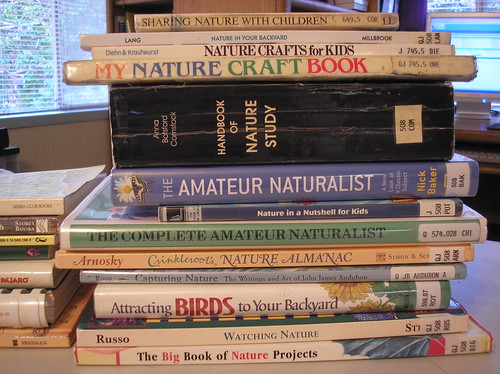My copy of the Handbook of Nature Study sat on my shelf for a couple of years and I finally sold it on ebay. Yes, you heard me right. I got tired of dusting it and feeling as if I should be doing something with it when I couldn't figure it out at all. So now you are wondering what happened to bring me around to where I am now. Simply put, I stopped fighting it.
I checked it out from the library and took some time to page through it. I read blogs where families actually used the book, encouraging me to give it a real try this time. We already had a love of nature in our family but we really wanted to have a better way of studying things in nature in a little more systematic way.
Maybe it was not the book that was the problem for us.
Since I trusted Ambleside Online's ideas for many subjects already, it was a natural fit to try their system for nature study. I went to their nature study page and read the whole thing. I then read the information in the Charlotte Mason volumes about outdoor time and nature study. I read other blogs that used the Handbook of Nature Study. In other words, I did a little bit of homework and came up with a plan for our family.
Tips from our experiences:
- Pick three sections of the book to cover in your school year....four if you want to cover one over the summer too. Try to think of things you will actually be able to observe in your course of everyday life. Do you have a birdfeeder? Do you have a pet cat or dog? Do you have a place to grow a few vegetables? Do you enjoy keeping track of the weather or looking at the clouds?
- Start with something you will enjoy.
- As the parent/guide, read the introduction to the section you are going to study a few times over. I have found that just reading these few pages opens your eyes to a lot of ideas for further study on the topic chosen. Use the information and suggested activities as a place to start your study of a particular animal or aspect of nature.
- Make notes in the book or in a notebook with ideas for your study.
- Go through your personal library and check for any reference items you may have on the subject of your study. I was surprised when I did this to find that I already owned quite a few books to go along with our fall study of insects. Check your library for books and field guides too.
- Our family enjoys identifying things we find on our nature outings. This means we need to have a basic field guide to go along with our study since the Handbook of Nature Study is NOT a field guide.



sigh... I'm still having trouble getting that big book off the shelf. I was thinking I need to go read about beavers after seeing the work they were doing at the pond on Friday. But, it seems so much easier just to "google." I'll try, though! And, thanks for your ideas and encouragement!
ReplyDeleteThanks for the encouraging word, Barb! :)
ReplyDeleteI had almost the exact same experience with the handbook, hauling it from Colorado to Alaska to Minnesota to South Carolina. I was never sure how to use it and the sheer size intimidated me. It would be like staring at all of Charlotte Mason's books stuffed into one volume!
ReplyDeleteI did not sell mine and I am glad to say that, not only are sections slowly becoming highlighted, but how to apply them is coming into sharper focus, all thanks to your blog.
Your blog is a great guide to those of us needing guiding . . .